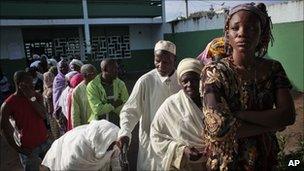'Historic' turnout in Ivory Coast's presidential poll
- Published

Ivory Coast's electoral commission has said that turnout in Sunday's presidential election was "about 80%", describing it as "historic".
The head of the UN mission in the West African country said turnout was among the highest ever seen on the continent.
Nearly 6m people were eligible to vote in the poll, aimed at reuniting the nation after eight years of division.
There are three front-runners for the presidency, including incumbent Laurent Gbagbo. Results are due on Wednesday.
The BBC's John James in Abidjan says people are desperate to find out who their next leader will be and relieved that the poll went smoothly.
Ivory Coast, one of the world's main cocoa producers, used to be West Africa's richest country until political unrest sparked by a coup against Mr Bedie in 1999.
The country has been divided in two since northerners took up arms in 2002.
'Exit strategy'
"We are at a turnout rate of about 80%, which historic," the Vice-President of Ivory Coast's Independent Electoral Commission, Mamadou Gnenema Coulibaly, said on Monday.
He added that such a result should "be the pride of everybody taking part in the electoral process".
In the country's first presidential election in a decade, President Gbagbo faces 13 rivals.
Former Prime Minister Alassane Ouattara, who is popular in the north and ex-President Henri Konan Bedie, from the party which governed the country for almost 40 years, are seen as Mr Gbagbo's strongest challengers.
In a BBC interview, UN Ivory Coast mission head Young-jin Choi congratulated Ivorians for their discipline during the Sunday's voting.
He pointed out that Ivory Coast was hugely important for the rest of West Africa, as it is the largest economy in the group of former French colonies which share a common currency, the CFA franc.
Mr Choi also said that a successful election could pave the way for the 8,500 peacekeepers to withdraw.
"We are confident, once this election is over peacefully and democratically, if we can deal with other issues quickly, then we can envisage an exit strategy," he told the BBC's Newshour programme.
Unrest fears
There were some reports of delays but voting was otherwise said to have been peaceful and turnout appears to have been good.
Representatives of the major candidates have praised the poll.
"We are on the right track," said Abdoul Toure of Mr Ouattara's RDR party, dismissing fears of violence.
Our reporter says there is optimism that people will react well to the results - unless there is evidence of fraud.
The poll has been postponed six times since 2005, when Mr Gbagbo's five-year mandate officially came to an end, amid rows over rebel disarmament and voter registration.
Although the New Forces rebels signed a peace deal with Mr Gbagbo in 2007, they still control the largely Muslim north, where many people say they faced discrimination under both Mr Gbagbo and Mr Bedie.
If no candidate manages to secure an outright victory, a second round will be held later this month.
All three main contenders believe they will win, raising fears of unrest when the results come through.
Many of the candidates for the top job have similar policies: relaunching the economy, reducing youth unemployment and stopping further conflict.
The delay in organising elections since the 2007 peace deal has put investments on hold, as well as postponing reforms of the cocoa industry which produces nearly 40% of the world's supply of the raw ingredient for chocolate.
- Published28 October 2010
- Published12 April 2011
- Published15 October 2010
- Published24 September 2010